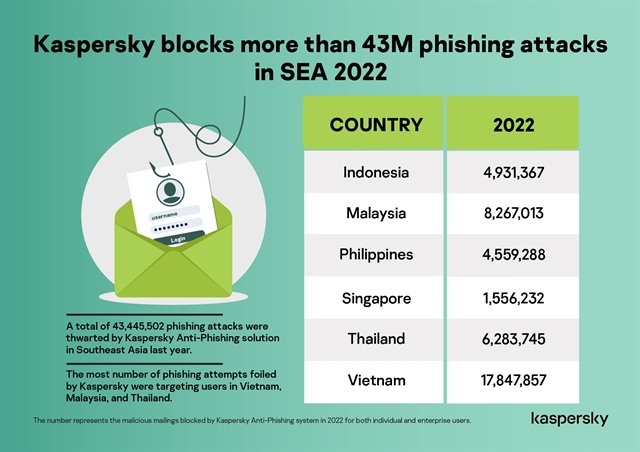Kaspersky protects more than 17 million users in VN from email phishing attacks
Global cybersecurity company Kaspersky thwarted an enormous number of email phishing attacks in Vietnam throughout 2022, for both individual and enterprise users, according to a recent company report.

Specifically, the total number of malicious mailings blocked by Kaspersky Anti-Phishing System in 2022 was 17,847,857 attempts, of which 1,569,005 attacks were targeted at businesses and the remaining 16,278,852 attempts eyed consumers.
In addition, data from the Authority of Information Security, Ministry of Information and Communications shows that 11,213 cyberattacks occurred in Vietnam during the first 11 months of 2022. Notably, phishing attacks accounted for 35% of the total attempts, indicating that the severity and scope of cybercrime attacks have been constantly expanding in recent years.
"In the past years, the local government and the local businesses in Vietnam have made significant efforts and progress in creating a safe digital environment. However, threats to information security and cybersecurity still exist, requiring enterprises as well as individual users to be constantly vigilant,” said Adrian Hia, managing director for Asia Pacific at Kaspersky.
“Our latest statistics for the country show cybercriminals continue to be creative in their attempts to phish individual as well as business users. We need to continue our efforts in safeguarding our assets and data online," he said.
Phishing is a type of cybercrime in which criminals attempt to obtain sensitive information, such as usernames, passwords, and financial data, by disguising themselves as a trusted entity within the network. These attacks typically involve the use of a phishing email, text message, or website designed to trick recipients into disclosing information.
In fact, not only has Vietnam witnessed a large number of phishing attacks, but other Southeast Asian countries have also experienced similar circumstances in recent years.
Globally, the number of phishing attacks increased markedly in 2022. Kaspersky’s Anti-Phishing system prevented 507,851,735 attempts of phishing.
“Recently, we have seen an increase in targeted phishing attacks where scammers don’t immediately move on to the phishing attack itself, but only after several introductory emails where there is active correspondence with the victim. Our experts predict that this trend is likely to continue. New tricks are also likely to emerge in the corporate sector in 2023, with attacks generating significant profits for attackers,” Hia added.
To avoid phishing, Kaspersky experts have recommended users learn to recognise phishing attacks, report phishing attacks and get antivirus and anti-phishing software.
